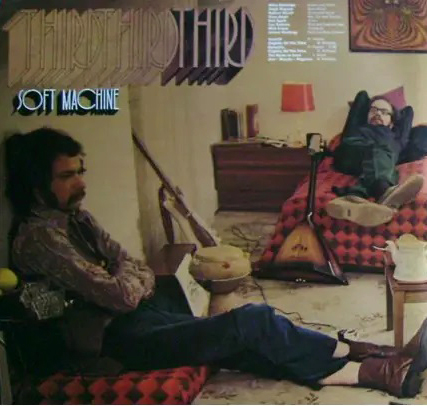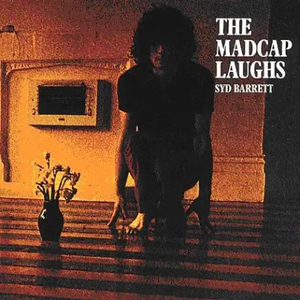| |
|
|
 'Staying Open to Possibilities': An Interview with Hugh Hopper - Eartrip Magagzine - Issue 2 - September 2008 'Staying Open to Possibilities': An Interview with Hugh Hopper - Eartrip Magagzine - Issue 2 - September 2008
“Staying Open to Possibilities”:
An Interview with Hugh Hopper
Bass-player and composer Hugh Hopper was one of the key members of the so-called ‘Canterbury Scene’: a loose, and disparate set of musicians who made up some of the leading prog-rock bands in the 1960s and 70s, such as Caravan, Gong, and the group in which Hopper was the bassist, Soft Machine. As well as appearing on some of the Softs’ best known recordings, and in subsequent off-shoots such as Soft Machine Legacy, he played with the likes of Syd Barrett and Elton Dean, and has also been active in improvised and experimental music, often incorporating electronic textures into his work. In February 2008, he played a concert with the Delta Saxophone Quartet and drummer Simon at Kettle’s Yard in Cambridge, and we took the opportunity to interview him about his career and his current musical activities.
DG: Perhaps we could begin at the beginning: how you started out, your early influences and musical experiences.
HH: My parents were the usual middle-of-the-road classical: they both played piano, but just at home, as people did in those days. I was really influenced a lot by my brother, who was two years older than me. He started playing clarinet and then got into playing guitar, so I took up the bass, and a lot of my influence is from my brother, because, being two years ahead, he heard things earlier than I did, and then I picked up on those.
So early days was rhythm and blues – Chuck Berry and stuff like that. And then I got involved in jazz, through Robert Wyatt and Daevid Allen. Really those have been the two threads of my life – rhythmic stuff and freer stuff as well, and also some modern classical and contemporary stuff.
DG: What kind of modern classical?
HH: Well, my brother exposed me to anything from Hindemith and Bartok to some of the more freaky stuff – Stockhausen and some of the more early electronic music.
NCT: Which was really just emerging at that time…
HH: Yeah, and of course it was really laborious in those days – you couldn’t do it on a laptop. Nowadays Stockhausen could do in half an hour what it took him six months to construct from tapes.
|
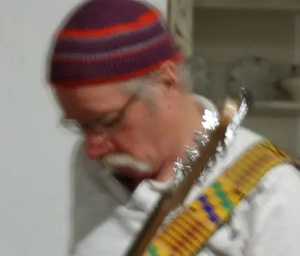
|
Hugh Hopper playing at Kettle's Yard. Cambridge in 2008
|
DG: That’s get us onto compute technology I read that you and so on at the age of 13
HH: No, that’s a bit early, I would say a bit later than that. I got into loops and stuff when I was about 18, through Daevid Allen. I was living with him in Paris and he’d been working with Terry Riley and people who were working with the French Radiophonic workshop. So I learned a lot of that kind of stuff – soundscapes, loops, that kind of hypnotic stuff – from him. That was another important thread in my musical influences.
NCT: Daevid Allen was also involved with some of the work of William S Burroughs. What was that relationship?
HH: Well, Daevid met Burroughs and we were involved in playing some shows, like the ICA in London, where he was doing a reading and I was playing with David and Robert Wyatt. I think Daevid knew Burroughs really from Paris and we were just interested in that whole flow of things – the cut-up idea of Burroughs. I was 18 years old and that was a very important time for me, being surrounded by Beat poetry and the cut-up idea – completely different ideas of writing. I haven’t read a Burroughs book now for thirty years, but at the time it was really a strong thing, and Daevid had actually worked with Burroughs – he used his voice, and that of Lawrence Ferlenghetti and some of the other Beat Poets, on some of his soundscapes.
NCT: And he was influential enough for you to name the band The Soft Machine [after Burroughs’ novel].
HH: In fact, before I was in the band, they went through several names, and then somebody thought of Soft Machine. Daevid spoke to Burroughs and asked if that was OK and he said ‘ah, I guess it’s OK’ – he didn’t really care either way.
DG: Well that bring us up to the beginnings of Soft Machine – maybe you could talk a bit about the Wilde Flowers?
HH: Yeah, Wilde Flowers was our first semi-pro band in Canterbury. Like all semi-pro bands, we played about two gigs in our first year, and there was more hope involved than actual gigs, but we rehearsed a lot, as you do when you start a band. That was really the foundation of Soft Machine, Caravan, and Gong – those three bands started from the people who were in the Wilde Flowers. We started off trying to be creative, playing all sorts of new stuff – we all listened to Indian music and jazz – and it was a mixture of that with some things like the Stones and the Kinks. Eventually what happened was that it became smoother and smoother, and became a soul band and lost it creativity, but by then people had left and it carried on without the originals.
NCT: There seems to have been a really interesting trajectory, if you look at all the Soft Machine albums, partly because of these creative tensions.
HH: Yeah, every album was different, depending on who was in the band. I think for just about every album there was a personnel change – at least one person had left. The first one was psychedelic songs. Really, there’s an album missing, because there should be an album with Daevid Allen, Kevin Ayers, Robert [Wyatt] and Mike Ratledge, but Daevid had already left the band before the first main album was made in the States, so it was just a trio. Kevin Ayers wanted to be a poet and songwriter more than a musician; he got lumbered with playing the bass because nobody else would do it. After Kevin left, I joined, and Mike Ratledge, the keyboard player, became much more influential in the music – it was a lot jazzier and less psychedelic and folky. That was the way it flowed really – it became more and more jazzy with each album, and finally became a jazz-rock thing.
NCT: By ‘Third’ and ‘Fourth’?
HH: Well, there was still a bit of the earlier spirit [on those two albums]. ‘Fifth’ was a weird one because it was very black – it had a black cover and it was a very dark record – and by ‘Sixth’ Elton Dean had left and Karl Jenkins was introducing more jazz-rock things. That was the last one I was on, and after that it became more of a Karl Jenkins thing.
NCT: Whether you intended it or not, ‘Third’ is the most popular Soft Machine album.
HH: Yeah, it’s the one everybody always mentions. When we recorded it, it was right at
the height of when we were really playing a lot of concerts, doing a lot of gigs, touring everywhere. For the actual sound of it, it’s not that well produced – the stuff I’ve been doing since then has been much better produced. But, what it can say, it’s just one of those things, it’s a classic thing. When I’m in Germany, guys still come up to me and say ‘this record changed my life’ – it happens every time, which is great.
|
Part of the inside cover at for "Third": Elton Dean on the left and Hopper on the right. |
DG: What would you say is your favourite of all the Soft Machine albums?
HH: I like bits of some of them. I like ‘Third’, obviously, and ‘Fourth’ – there’s some good stuff on ‘Fourth’ – different things, I don’t often listen to them. What I prefer really is listening to some of the live things which come out much later, because the studio records…They’re OK, they’re interesting, but they don’t have the real spirit of the band as it was live, because it was real hooligan band, it wasn’t a quiet, polite band on stage. Sometimes I listen back to some of the tapes – terrible sound, but the energy is fantastic. There’s this idea that it was a cerebral band, but it wasn’t that all – we used to play through Marshall stacks on eleven, basically. We had earplugs, and everyone was deaf by the end – I still have tinnitus now. So yeah, I was glad when, in about the 80s, some of these archive records, the live ones, started to come out, even as bootlegs, which didn’t have good enough sound; it was nice to hear what the actual energy of the band was like.
DG: There’s this whole generic crossover thing we’ve touched on a bit earlier; I was interested in the fact that you played the Royal Albert Hall, at the Proms. It’s hard to imagine something like that happening now – musicians associated with rock performing in a setting associated with the mainstream classical sphere.
HH: It was one of the late night concerts after the main prom, and it was actually a concert of Tim Souster, who was a classical composer and knew Mike Ratledge, so he invited us to play as well. Before we played there was a whole piece with, I think, five pianos playing Steve Reich. So it wasn’t the real mainstream prom, it was a late night one, but it is still quite rare.
DG: Do you think people were more open to that sort of thing at the time?
HH: Yeah, well people were more open to having a band like Soft Machine playing anywhere – we played in all the big halls several times. We played…I mean, you name it – Manchester, Leeds Town Hall – you couldn’t do that now, people just aren’t interested. So, yeah, it was a different atmosphere in those days.
|
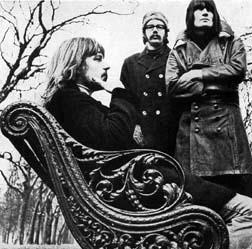
|
L-R: Robert Wyatt, Hugh Hopper, Mike Ratledge |
DG: Also, as well as the relationship that Soft Machine had with classical music, there was quite a strong relationship with jazz.
HH: Yeah, well it was because were interested in all those things, Mike Ratledge in particular. He didn’t come up through rock groups, he learned to play classical piano and then became interested in jazz later. He wasn’t a guy who’d learned through being in a pop or rock or blues band – he didn’t know anything about that, it wasn’t part of his life at all. So we had all those influences and that’s the stuff we wanted to listen to – things like John Coltrane and Ornette Coleman.
DG: And this was part of a wider trend.
HH: There was a great crossover then: before that you were either a jazzer or you were a rocker and that was it, but in about 1969/70, there really was a possibility, people were putting on gigs that mixed things – it could be ethnic music or classical music or whatever, mixed – there were all kinds of experiments.
DG: So the 60s was the time when it opened up.
HH: Yeah, from 66/67 onwards – that was the time when things seemed possible.
DG: Do you think there was any specific reason for that?
HH: It was the time – politically things were changing , there was a lot more freedom, and suddenly you’re allowed to do things which before people hadn’t thought of doing. There was a feeling of liberty.
DG: Moving on to prog-rock itself – do you think there was anything specifically English about it? I’m thinking of that very whimsical strain…
HH: Yeah, you can’t imagine many American bands sounding like that. Americans tend to be much harder, and probably play better, but not so whimsical and not so creative, in a sense. I think that’s right, it is a very English thing.
NCT: As you were saying, you started off in R & B and stuff like that. I was curious – who really influenced you as a bass player; who did you listen to?
HH: Strangely enough, I’ve been more influenced by acoustic jazz players than electric players. Because I listened to all of those earlier things – rhythm and blues things, Fats Domino, Little Richard, James Brown and his bass players – it’s all in there. But when I think about it, the people I would actually name are all jazz bass players – Charles Mingus, Ron Carter, people like that.
NCT: How has being a bassist influenced your compositional approach?
HH: It’s hard to say, because they’re both part of the same thing. The bass is important to me – when I hear music, I couldn’t really imagine writing much music without writing something for the bass at the bottom of it. And also I see my role as a bass player not as a flashy soloist, and for me that’s important, to actually be ‘the bass player’.
NCT: How in terms of how your compositions might have differed from those of someone like Mike Ratledge, or Elton Dean?
HH: Well, they’re simpler, for a start: I haven’t got that kind of technical facility on the instrument. Of course, now, on a computer, you can write anything you like, at any speed you care to name. But yeah, it has been important.
DG: I wanted to ask about Syd Barrett particularly, because you played on a couple of tracks on his album ‘The Madcap Laughs’, and because, despite only being there at the beginning, he was such a pivotal, influential figure. What was your experience of him?
HH: I didn’t know him very well. Because Soft Machine and Pink Floyd started when they did – ’66, ’67 – they were playing a lot of the same gigs, at the Roundhouse in London, and the U.F.O, so they were quite friendly: they were kind of rivals but it was a friendly rivalry. I came in later, so I didn’t know him that well, but he came along to a gig we were doing in London in ’69, and saw us afterwards and said, ‘I’m doing a record at Abbey Road, do you want to come and play on the record?’ So we went along, and he’d got the guitar and voice tracks down already. Of course he was very erratic, so it’s not 4 bars, 4 bars, it’s one and half, two –whoops – start off in another key! We’re sitting there trying to learn this in the studio in Abbey Road, and we’re still working on it when Syd pokes his head round the door and says, ‘thanks, fine, that’s it’, and we were still learning it, but he was happy…He was very chaotic, and even then he was drifting a bit. It was a nice record, it couldn’t be anyone else – he had his own total planet.
DG: What do you think of this whole idea of the ‘Canterbury Scene’?
HH: Well, it’s a journalistic thing. In fact, there was nothing much going on; we couldn’t wait to leave Canterbury and move to London and have a real career. But it’s a useful label – I use it myself. But ask different people what it means and it means completely different things. For me it means people like Caravan, Soft Machine and Gong, but then they’re very different anyway: Caravan is songs and Soft Machine became much more jazzy, so what does it mean? It’s a useful label, it’s a journalistic label, which was applied after the event – Ian McDonald, of NME, actually thought of the label in about 1971, well after it had all happened.
DG: Someone else I wanted to ask about was Elton Dean: obviously a very important figure but not that well known outside of particular circles.
HH: He was a great jazz player, he really was. His real love was free jazz – he would have been perfectly happy freely improvising all his life, but he wrote some great tunes as well and was a great player in Soft Machine, In Cahoots, lots of bands – he did a lot of stuff with Keith Tippett. He lived the real jazz life, he drank and he smoke and he died as you do if you drink too much, but he lived it to the full, he was totally committed. And he was a good mate of mine – I was in lots of projects and did lots of tours with him. It wasn’t a surprise when he died, because for the last ten years of his life he was on that path, but I’m happy to have played with him.
DG: Thinking about free improv – we were talking with Mike Westbrook about free improv and how it relates to other genres. So, players you’d think of as, say, a straight-ahead jazz player or something, could play free improv as well, but a divide had opened up that wasn’t there before – people had gone off into camps and so you had the free improve players…
HH: I think that was always there, to be honest. There’s always been a lot of snobbery within the jazz world, as there is in every other musical genre. Elton could do both things, he was a natural player, a very natural musician.
DG: Perhaps you could tell us a little bit about ‘Numero D’ Vol’ [Hopper’s recent recording, from 2007, with saxophonist Simon Picard and others].
HH: I was down in London with a guitarist called Mark Hewins. I was immediately knocked out by his sound, his melodicism, and I thought it would be nice to invite Simon [Picard] down to Canterbury to record, and the same with the other players. I’ve played with Charles Hayward in a couple of things, and Steve Franklin with In Cahoots. I just had the idea to get together with a group of players. It was completely improvised and cleaned up a bit later – we chose the best bits.
DG: The project with the Delta Saxophone Quartet, how did that come about?
HH: They weren’t particularly into Soft Machine, but I had a book of sheet music, of some of my tunes from Soft Machine, which was published in 1970, and somebody gave it to Pete Whyman, the alto player, and he just started playing with it. Then they farmed it out to arrangers to arrange these pieces, not necessarily from the music, but just that they had the idea of Soft Machine, so some of the music was very close to the originals and some of the pieces are completely re-interpreted. When they were near to recording they asked me if I’d like to play on one track, and since then we’ve done a couple of gigs and the album’s come out [[‘Dedicated To You…But You Weren’t Listening’ (Moonjune, 2007)]. What’s amazing is that they’re not blasé jazz musicians – they love music, they love playing it, it’s a real pleasure being with them. They’re keen for me to play with them – it’s nice. It’s just one track on the record’, but now we’ve worked on three or four new pieces – well, old Soft Machine pieces, but reworked.
DG: Are there any other plans for the future? Any projects?
HH: Lots, yeah. Yumi Hara, the Japanese piano player – I’ve done one gig with her, completely improvised, and there’s a tour of Japan in June. There’s also Clearframe, another improvised thing with Charles Hayward, Orphy Robinson and Lol Coxhill. I do this thing called Brainville with Daevid Allen and Chris Cutler; we played a few gigs last year, and we’re playing in Italy this year. And there’s also Soft Machine Legacy, which is ex-members of Soft Machine. So there’s four or five different things going on. It’s always up and down – I never know what I’m going to do in a years’ time, but I like to stay open to possibilities.
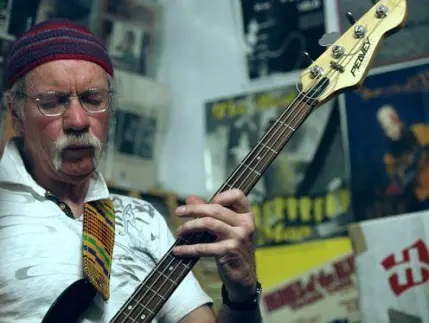
Hugh Hopper at the Downtown Music Gallery in 2008 |
|




